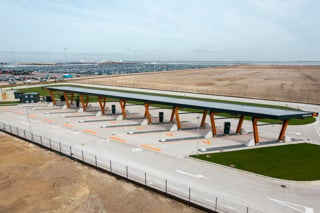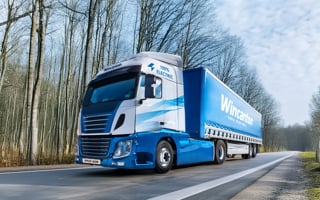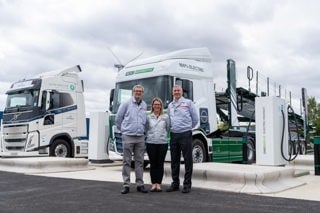Yusen Logistics has become the first haulier to deliver production parts directly into Nissan’s Sunderland plant using an electric heavy goods vehicle (eHGV).
It covered a total route trip of 703 kilometres (436 miles), and provided real-world testing of the electric truck before going live with the end-to-end scheme, which will deploy 10 eHGVs.
The Yusen Logistics warehouse in Derby has the capacity to charge three eHGVs at any one time, while its Leeds site has also installed three 360kw and seven 43kw eHGV charging bays, allowing the site to charge 10 eHGVs.
The average charger speed is 250kwh with an average time to charge being 2.5 hours to full capacity.
The project is part of Electric Freightway, led by Gridserve and part of the Zero Emission HGV and Infrastructure Demonstrator programme, funded by the Department for Transport (DfT) and delivered in partnership with Innovate UK. The trial runs from September 2025 to September 2030.
Yusen Logistics UK and Nissan Motor Manufacturing UK’s (NMUK) charging station will support a fleet of 25 trucks with a charging capacity of up to 360kW, saving around 1,500 tonnes of CO₂ annually.
The trucks will collect parts from Nissan’s UK supply base, from the Midlands to Port of Tyne which equates to more than 2.4 million kilometres (1.5m miles) travelled per year, fully electrified, saving 1,500 tonnes of CO₂ annually.
Transport minister, Lilian Greenwood, said: “We’re working closely with the road freight sector to slash transport emissions, and our £200 million zero emission HGV programme is helping businesses across the country to power the electrification of its fleets.”
“It’s great to see Nissan taking advantage of our scheme,” she added.
Back in 2022, the idea was formed to establish a consortium focused on exploring ways to reduce CO₂ emissions within the logistics sector.
Nissan approached Yusen Logistics to join a partnership aimed at transforming the existing logistics solution from internal combustion engine (ICE) vehicles to electric vehicles (EVs).
The initiative required a new way of thinking, to develop a charging infrastructure that could accommodate a wide geographical area, while also reimagining route planning to minimise disruption caused by charging downtime.
“Our Leeds and Derby sites were selected for the trial due to their strategic importance in supporting our customer, Nissan,” said Ray Blackham, regional general manager at Yusen Logistics UK.
“This initiative has been made possible through close collaboration with Nissan and reflects our shared commitment to sustainability.”
Dave Reynolds (pictured), driver at Yusen Logistics UK, says it has been “exciting” watching all the changes happen both at the Leeds site and at the Nissan ‘charging yard’.
“After we all completed familiarisation and driver conversion by the Volvo team at Crossroads Birstall, we talked about the usual ‘range anxiety’,” he added.
“Now I’ve had the opportunity to do several journeys in the vehicle, that worry has rapidly faded, with the planned charge stops on each route.
“The eVolvo is excellent and amazing to drive, I’m definitely looking forward to driving these more in the future.”
Daniel Kunkel, CEO at Gridserve, believes that the decarbonisation of transport logistics is much stronger and reaches far wider when done in partnership.
“This is why, as leaders of the Electric Freightway consortium, we are so pleased to support this UK first with Nissan and their haulage partners,” he said.
“Depot charging is critical for the electrification of HGVs, going hand in hand with future public infrastructure developments.
“As a first shared usage site, this location is leading the way in sustainable freight logistics.”
























Login to comment
Comments
No comments have been made yet.